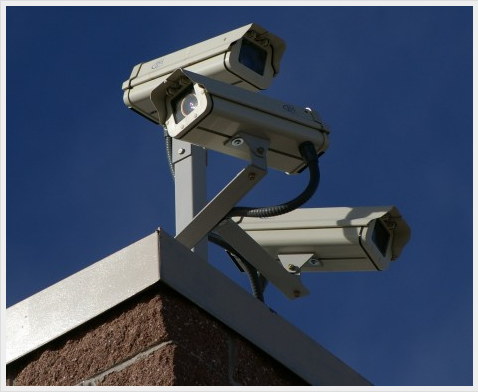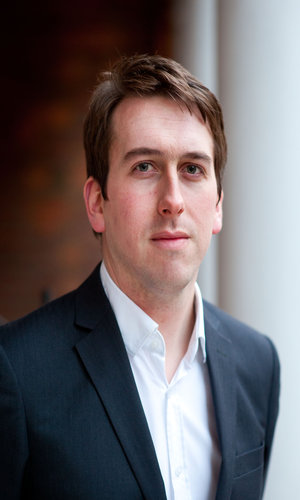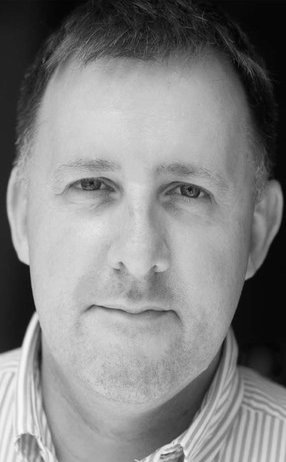
Photo: Hustvedt
Watching you, watching me
05 February 2014
by Richard Forster
Technology is helping cities become more efficient, sustainable and secure but at what cost to our privacy? By Nick Michell
Modern surveillance cameras can be a valuable tool in the management of public safety and security, for the protection of people and property, and crime prevention and investigation. However, any increase in the use of surveillance camera systems will increase the likelihood of an intrusion into the privacy of city residents.
Former CIA employee, Edward Snowden, has been pilloried or praised depending on your personal view for his revelations about the US National Security Agency but his actions have certainly led to a change in US practices. As Snowden said, privacy matters. “A child born today will grow up with no concept of privacy at all,” said Snowden during a presentation broadcast on the British television network, Channel Four.
“They’ll never know what it means to have a private moment to themselves an unrecorded, unanalysed thought,” he said. “And that’s a problem because privacy matters. Privacy is what allows us to determine who we are and who we want to be.”
Nick Pickles, Director of Big Brother Watch, a UK based privacy and civil liberties campaign group, says surveillance carries a social impact, leads to self-censorship and increases people’s fear of crime. “CCTV (Closed-circuit television) is a tool, but in too many places it has become a substitute for policing,” says Pickles. “Repeated studies have found it is ineffective at deterring crime, while also indiscriminately monitoring members of the public.”
With concerns over the potential for the abuse or misuse of surveillance by the state in public places, the UK Home Office introduced a new code of practice in August 2013 covering the use of surveillance cameras by bodies such as local authorities in England and Wales. The code sets out guidelines for CCTV and Automatic Number Plate Recognition (ANPR) systems. The idea is to ensure their use is open and proportionate and that they are able to capture quality images giving the police a better chance to catch criminals and cut crime.
The principle of surveillance by consent is at the heart of the new legislation, with a purpose of ensuring that individuals and wider communities have confidence that surveillance cameras are deployed to protect and support them, rather than spy on them.
The announcement of the code follows Andrew Rennison’s appointment as the first Surveillance Camera Commissioner last year. He encourages all operators to comply with the code and report back to parliament with any concerns.
“This government believes CCTV and ANPR are both vital tools. But it is crucial they are focused on aiding the fight against crime and protecting the public,” said Lord Taylor of Holbeach, Minister for Criminal Information, when the code came into force. “I am pleased we now have in place a code that, together with the work of the independent surveillance camera commissioner, will better harness these technologies and help put an end to CCTV systems growing without proper oversight.”
The code states that cameras must be used “in pursuit of a legitimate aim” and when it “meets a pressing need”. The code of practice restricts access to and retention of data, and encourages private operators to apply the code as well as public bodies.
Although Pickles believes this to be a step in the right direction, he questioned whether Rennison had the powers or resources to CCTV properly.
“It is a useful first step, but the fact it is voluntary is probably going to cause problems down the line, because ultimately a regulatory framework is only really as useful as the ability it has to stop activity that crosses the line,” Pickles says. “The challenge has always been asking people to define why they are using cameras, and whether the cameras will actually achieve that aim, so hopefully the code adds more weight to the fact these issues should be considered.”

In Ontario, Canada, for example, since the early 1990s, the Video Surveillance Guidelines in Public Places, stipulate compliance by those using CCTV cameras.
Before a camera is set up, municipalities and law enforcement, have to decide if is it justified, whether there are less invasive alternatives–such as more police on the beat. They must also decide whether it is proportionate and effective, for instance to have a camera on every lamppost in a park.
“So you can install a programme with a number of cameras but you have to justify and evaluate every single camera and their benefits,” says Michelle Chibba, Director of Policy at the Information and Privacy Commissioner’s Office, Ontario. “You also have to provide a business case every time you move a camera. Whenever law enforcement or municipalities are considering putting up cameras they should go out for public consultation and get the views of the community, and from their studies many neighbourhoods are more than happy to have them installed, particularly in areas with high crime rates.”
Similarly in Vienna, Austria, The Federal Act on the Protection of Personal Data (Datenschutzgesetz), introduced in 2010, has a set of rules. They include lawful purposes for CCTV, such as protection of a person or something observed, or the fulfilment of legal duties of diligence.
The Vienna City Administration insists that it strictly adheres to these rules and takes them very seriously, opting for the least intrusive choice.
“If there are concerns, they seem to be outweighed by the concerns for public safety,” says a Vienna City spokesperson when asked about abuse concerns. “There have been a few instances in Vienna recently when an offender has been successfully identified using video footage collected by surveillance cameras. These incidents may have led to a more positive attitude towards the use of CCTV cameras.”
How much concern over privacy is there?
While it is assumed the increased use of CCTV cameras would automatically raise privacy concerns among citizens, a pan- European research study commissioned by the Siemens Security Products sector found most consumers did worry about CCTV infringing on their civil liberties. It also reflected overwhelming support for the use of CCTV in reducing crime. The study by YouGov between February and March 2013, polled more than 6,000 adults in France, Germany, Spain, Sweden and the United Kingdom.
Peter Hawksworth, CEO of Security Products at Siemens says: “The use of CCTV elicits strong feelings either for or against, and Siemens has concluded that most of the figures quoted and statements made are based on the type of conjecture and misinformation that suits a particular argument. Therefore, we wanted to find out what the public really thinks about its ability to reduce crime and whether CCTV infringes upon civil liberties.”
Respondents were asked to agree or disagree with two statements. The first: ‘I believe that the widespread use of CCTV cameras infringes on people’s civil liberties’. In Sweden 69 percent said that they felt that CCTV did not curtail freedom, followed by the UK (65 percent), France (57 percent) and Germany (45 percent). In Spain, however, the figure was much lower at 33 percent said.
The second statement: ‘I agree that CCTV cameras are useful in reducing crime and providing evidence to the police’. Despite the negative perception in Spain on privacy, 89 percent of respondents agreed with this second statement, more than other countries. Spain was followed by Sweden (88 percent), France (83 percent), the UK (81 percent), and Germany (77 percent).
Commenting on the findings, Hawksworth said: “The overwhelming agreement that CCTV acts as crime deterrent suggests that people are making a ‘trade off ’ by balancing their concerns about civil liberties against the perceived benefits that CCTV brings to the detection and prosecution of crime. The figures also give a strong indication of the confidence the public has in the effectiveness of this technology and the role it plays in keeping them safe from harm.”
Pickles, however, says it was impossible to have a debate when barely any data was publicly available on the effectiveness of CCTV and the negative impact of it being the only visible presence of law enforcement in many areas.
“Amazing, a poll commissioned by someone selling CCTV that says CCTV is a good thing!” says Pickles. “The CCTV debate in Britain has taken place without any evidence, and I think when people start to realise how it has done very little to reduce crime and is not the silver bullet many claim it to be, then attitudes may well shift. Ask people if they’d rather have less CCTV and more police officers on their streets and I expect you’d get a very different answer. What the survey totally fails to do is help us have an informed debate about why Britain compared to many other countries has such a high number of CCTV cameras, intruding on all our privacy, without any discernible benefit.”
Smart meters
CCTV cameras are not the only advance in technology that have caused concerns over civil privacy. Smart meters with their ability to collect personal household data are also under scrutiny.
Ontario has more than 4.7 million smart meters. They track electricity consumption in the home or at work allowing power companies to pinpoint and respond more quickly to outages, and vary prices depending on usage.
Indeed, smart meters can provide detailed information on what goes on at home–such as what appliance is being used when, its age and condition, when the owners are at home or out, how many live there, and other data considered private.

“When the government made it a law to install smart meters in all households, Ontario’s Information and Privacy Commissioner, Ann Cavoukian, predicted that privacy was going to be an issue that would be overlooked,” says Michelle Chibba. “So she went out publicly to raise awareness about privacy issues, and we wrote papers setting out what the main concerns were, and tried to get the public, the organisations that were implementing the meters and the government itself, to understand and appreciate that the game was changing by placing a fairly sophisticated computer into a household.”
As a result the Canadian government introduced a directive whereby, utilities have to conduct a privacy impact assessment. The Information and Privacy Commissioner’s Office produced papers and partnered with a number of utilities with considerable coverage in Ontario. The aim was to provide privacy guidelines before going ahead with smart grid installation.
“The Commissioner calls it privacy by design. This entails being proactive from beginning to end in ensuring the best efforts are made to meet the objectives of maintaining the protection of privacy and utilising the advantages of innovative data collection,” says Chibba.
“Of course technology needs to be used responsibly, but it’s important to understand that privacy does not stand in the way of innovation.”
The key to success
Transparency is key to reassuring people that their sensitive data is not being collected for any other purposes. In Vienna public hospital patients, for example, have asked questions about the protection of electronic health records.
“One of the major concerns that people have is that their personal data may be used for purposes they don’t know of or cannot control,” explains a Vienna city hall spokesperson. “To dispel these concerns, transparency regarding data applications is vital. Experience shows that citizens are more concerned nowadays about privacy issues, but also more aware of their individual right to data protection.”
Google Earth
Since its launch in 2005, Google Earth has come in to criticism from a number of special interest groups, including government officials. They worry both about personal privacy and national security. Many people worry about the public distribution of aerial photographs taken above their homes or properties.

The privacy concerns of Google Earth revolve around the ability of anyone around the world having instant access to high- resolution imagery of personal property, homes, cars and even individuals. If a person is able to find themselves in a photo they can ask to have the image removed. But there is no easy way of knowing if you have been photographed or how long the picture has been readily available. People can check out their own homes in Street View and ask to further blur/remove these images if there is any objection.
Google already blurs faces and vehicle license plates. And Ed Parsons, a Geospatial Technologist at Google, said that there shouldn’t be a privacy concern with Google Earth, because it stringently adheres to the law.
“When it comes to Google Earth, there really isn’t much for people to be worried about in terms of their privacy,” he says. “It is illegal to pass on any personal identification information to third parties without the individual’s consent. It is only group information that gets passed on. Information that is actually useful and potentially beneficial, for instance the most searched for destinations.”
Google Earth is an innovative piece of software that allows users to explore places they know and want to know. The Street View layer gives a 360 degree panoramic view as if they were standing in the middle of the street.
Location and smart phones
Another privacy hot topic is that not everyone knows that they can be tracked all day via their smart phones, social media websites and various so-called apps. Most apps ask whether they can use your current location before using it, something most of us do without even thinking about it. In fact a lot of apps need your location to work successfully. Every time someone uses Google Earth they are giving away their exact location. Similarly, when a search is made with Google, the IP address of that computer is matched to a specific location. The word ‘plumber’, for example, will generate results for local tradesmen, rather than a random list of those around the world.
“It’s going to be harder to have a completely private life with the advances in technology and use of social media, but this doesn’t have to be looked at as
a negative thing,” says Parsons. “We are part of this through our use of technology and acceptance of apps that want to use our location. But if you really do want to live a more private life, it is still possible.”
The happy medium
Asked if it was possible to find a happy medium between ensuring the safety and protection of the public, protecting privacy, Pickles says: “Transparency is key, we need far more data to be in the public domain about how effective systems are, what they are used for and where the information systems gather is flowing.”
In an age where surveillance was now part of commercial business models and our everyday lives are lived in close contact with technology recording everything, he says, legal frameworks and safeguards have to be in place.
“Whether it’s a matter of government surveillance or commercial monitoring, in a digital age I think that is the greatest challenge facing citizens and we are a long way from reaching a point where people can be happy the balance is at least close,” he says.
In revealing the extent of the US secret surveillance programme, Edward Snowden’s aim was to enable people to choose how their governments watched them.
“The conversation occurring today will determine the amount of trust we can place both in the technology that surrounds us and the government that regulates it,” Snowden said.
“Together we can find a better balance, end mass surveillance and remind the government that if it really wants to know how we feel, asking is always cheaper than spying.”








